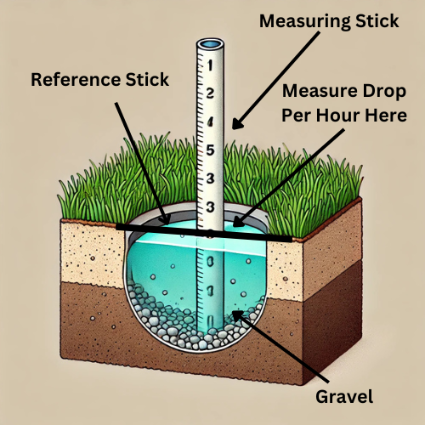Percolation Test Guide for Real Estate Developers, Agricultural Landowners, and Contractors in Long Island
In Long Island, real estate developers, agricultural landowners, and contractors must conduct percolation tests to ensure soil suitability for projects ranging from residential development to large-scale farming operations. These tests are essential for determining how well the soil absorbs water, a critical factor in planning for septic systems, foundations, and site drainage.
Failing to conduct a percolation test can lead to costly construction delays, environmental hazards, and even legal challenges due to non-compliance with local regulations. For any land development or construction project, ensuring the proper absorption rate of the soil is a key step in protecting both the environment and the long-term value of the property. Keep reading to learn more about the percolation test and what it’s importance is in construction.
Contact Us Today to Schedule Your Percolation Test and Ensure Your Project Complies With All Necessary Regulations.
What Is a Percolation Test?
A percolation test, or “perc test,” measures the rate at which soil absorbs water. This test is a vital part of site planning, especially for areas where septic systems are used. It helps determine whether the soil is capable of handling wastewater without causing contamination or overflow issues. During a percolation test, small holes are dug in the ground, filled with water, and the time it takes for the water to be absorbed is measured.
For real estate development, agricultural projects, and construction, percolation tests are necessary to ensure that the soil can support infrastructure like buildings, septic systems, and drainage networks. In agricultural settings, percolation rates influence decisions about irrigation and water management. In construction, knowing the percolation rate is critical for designing foundations and ensuring that water drainage systems are adequate to prevent flooding or erosion.

What Is a Percolation Test Used For?
As we stated above, a percolation test is used to determine the soil’s ability to absorb water efficiently, which is crucial for several aspects of land development:
- Septic System Installation: The test ensures that the soil can properly absorb wastewater from a septic system. If the soil has poor percolation, the system may fail, leading to costly repairs and potential environmental contamination.
- Determining Soil Stability for Foundations: The percolation test helps assess whether the soil can provide a stable foundation for buildings. Poor water absorption can lead to soil instability, increasing the risk of foundation settling or cracking.
- Water Drainage and Erosion Control: Proper drainage is critical for preventing waterlogging, soil erosion, and structural damage. A percolation test helps in planning drainage systems that keep excess water away from foundations and important infrastructure.
By understanding the percolation capacity of the soil, developers and contractors can make informed decisions that enhance the safety, stability, and longevity of their projects.
Soil Percolation Test: Process and Timeframe
A soil percolation test typically involves several steps:
- Site Preparation: The testing area is cleared, and holes are dug to specific depths based on the project’s requirements.
- Borehole Drilling: Holes are filled with water to observe how quickly the soil absorbs it. The absorption rate determines the percolation rate.
- Laboratory Testing: Additional soil samples may be taken to analyze composition and moisture content.
The process usually takes 1-2 days, but factors such as weather, site conditions, or the complexity of the land may extend this timeframe. Delays can occur if additional testing or soil stabilization is needed.
Percolation Test Report and Results Table
A percolation test report typically includes:
- Water Absorption Rates: Measured in minutes per inch of water drained.
- Soil Characteristics: Details on soil composition, moisture content, and stability.
- Recommendations: Based on the test results, suggestions for septic system design, foundation support, or drainage improvements.
A results table provides a clear visual representation of the data, allowing developers and contractors to make informed decisions on how to proceed with the project. Detailed reporting is essential for both regulatory compliance and efficient project management.
Long Island, Brooklyn, and Queens Building Codes: Percolation Test Requirements
In Long Island, Brooklyn, and Queens, building codes mandate percolation testing for any new construction or significant renovation that involves installing a septic system or major drainage work. Local regulations require that percolation tests be conducted and passed before permits are issued.
Key requirements include:
- Septic system permits: A passed percolation test is mandatory to ensure the soil can safely absorb wastewater.
- Drainage system planning: Proper testing ensures compliance with local laws to prevent flooding or soil erosion.
Failing a percolation test can delay construction timelines or require costly soil treatment solutions to meet code requirements.
What We Do: Our Testing and Assessment Solutions for Real Estate Developers, Landowners, and Contractors
Our comprehensive testing services ensure that your project meets all local regulations and is built on a solid foundation. We offer:
- Geotechnical Soil Testing: Geotechnical soil testing assesses the soil’s strength and suitability for construction.
- Compaction Testing: Compaction testing helps verify that the soil is dense enough to support structures.
- Environmental Testing: Environmental testing helps identify potential hazards like contaminated soil or high groundwater.
- Seismic Testing: Evaluate seismic risks (if applicable) for structural stability.
- Ground Improvement: Ground improvement helps strengthen the soil to enhance support for heavy structures.
- Slope Stability and Erosion Control: Slope stabilization ensures your land is safe from landslides and erosion.
Protect Your Project with a Reliable Percolation Test in Long Island, Brooklyn, or Queens, NY!
Percolation testing is a critical component of any development project, ensuring that the land is suitable for construction, drainage, and septic systems. Skipping this vital step can lead to foundation instability, septic system failure, or environmental damage, all of which are expensive and time-consuming to fix. By investing in accurate, timely testing services, you ensure your project stays on track, meets local regulations, and protects your long-term investment.
Schedule Your Percolation Test With Our Expert Team Today to Ensure Your Project Stays on Track and Compliant With Local Regulations!